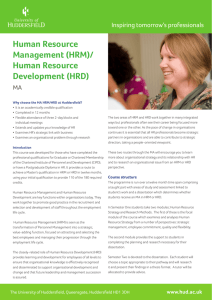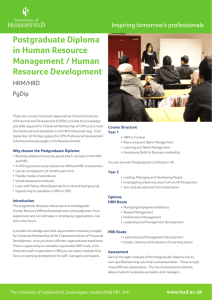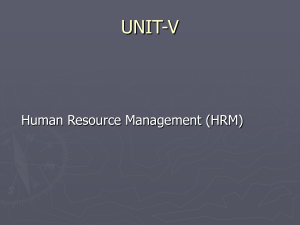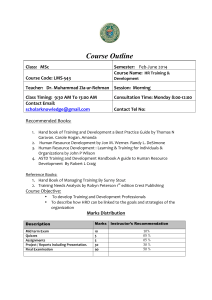HRD 6391 Advanced Seminar in HR: Human Resource Strategy
advertisement
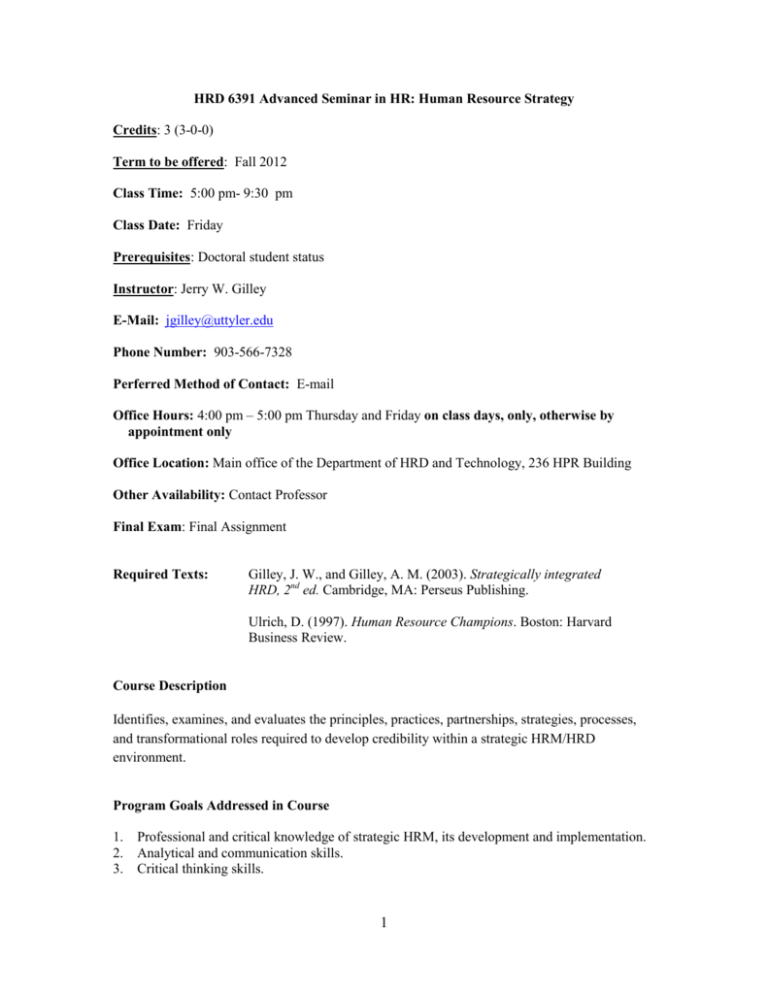
HRD 6391 Advanced Seminar in HR: Human Resource Strategy Credits: 3 (3-0-0) Term to be offered: Fall 2012 Class Time: 5:00 pm- 9:30 pm Class Date: Friday Prerequisites: Doctoral student status Instructor: Jerry W. Gilley E-Mail: jgilley@uttyler.edu Phone Number: 903-566-7328 Perferred Method of Contact: E-mail Office Hours: 4:00 pm – 5:00 pm Thursday and Friday on class days, only, otherwise by appointment only Office Location: Main office of the Department of HRD and Technology, 236 HPR Building Other Availability: Contact Professor Final Exam: Final Assignment Required Texts: Gilley, J. W., and Gilley, A. M. (2003). Strategically integrated HRD, 2nd ed. Cambridge, MA: Perseus Publishing. Ulrich, D. (1997). Human Resource Champions. Boston: Harvard Business Review. Course Description Identifies, examines, and evaluates the principles, practices, partnerships, strategies, processes, and transformational roles required to develop credibility within a strategic HRM/HRD environment. Program Goals Addressed in Course 1. 2. 3. Professional and critical knowledge of strategic HRM, its development and implementation. Analytical and communication skills. Critical thinking skills. 1 Course Objectives / Outcomes 1. Identifies, examines, and evaluates strategic HRM Method of Evaluation (Assignments) 1. 2. Complete the developmental assignment Class participation/attendance 90 points* 10 points If a group effort, 50% of project grade is based on peer evaluation(s) Your mission in this course is to critically identify, examine, and evaluate strategic HRM to establish credibility within an organization. All papers must be double spaced and should incorporate appropriate headings (see below). Assignment 1: (90 points) You have recently been hired in a large organization (use your organization if you desire) as an HRM and/or HRD practitioner and will report to the Executive Vice President of HRM and Development. After three weeks on the job, you remain confused as to your responsibilities and duties in your new role. As a result, you call your new boss to discuss the dilemma and his only response was to “establish credibility within the organization.” You thank him for the clarification and sit quietly at your desk wondering “what do I do now?” However, prior to being hired, you read the following two books addressing strategic HRM/HRD, which has challenged your basic understanding of the field of HRM/HRD. Gilley, J. W., and Gilley, A. M. (2003). Strategically integrated HRD, 2nd ed. Cambridge, MA: Perseus Publishing. Ulrich, D. (1997). Human Resource Champions. Boston: Harvard Business Review. Perhaps these resources will help you determine you plan of action for establishing credibility within the organization. If you choose to accept this assignment, answer the following question, “what do I do now?” Tentative Schedule Week 1/11/13 Topic / Reading / Assignments Strategic HR, HRM and HRD 2 2/1/13 Strategic HR, HRM and HRD 2/22/13 Strategic HR, HRM and HRD 3/22/13 Strategic HR, HRM and HRD 4/19/13 Findings (Assignment 1, due) Grading Policy All assignments are due on the specific date posted. Failure to meet these specific deadlines will result in a reduction in the points a student receives for an assignment (2 points per week). Furthermore, students must inform the instructor if they will be unable to meet any of the assignment deadlines. Each assignment will be graded based on: the assignment questions evidence that each of the corresponding learning objectives has been satisfactorily addressed. Participation and Attendance (10 points can be deducted from your grade if you fail to meet this criteria) Participation is not mere attendance in the class! In order to effectively participate in the course, it is critical that you read the course assignments and participate in class discussions, simulations, and in group work. The participation grade will be based on your participation both in class as a whole and in small groups. This grade is a “value added” assessment; in other words, sheer frequency or volume of verbal activity is not necessarily the goal of class participation. The grade is derived from meaningful dialogue based on reading and thinking reflectively. Each class missed deducts points from your grade unless the absence is approved by the instructor. Coming to class late or leaving early can adversely affect your attendance and participation points. To participate in class more fully, you will need to prepare at least three questions based on: class readings; pervious class discussion; concerns, insights, or inquiries; questions not covered in the readings; or other relevant information meaningful to the class. Grading Scale: A+ (101 % or more) A (90-100 %) B (80-89 %) C (70-79 %) D (60-69 %) Superior work and evidence of exceeding each of the learning objectives at an advanced level Excellent work and evidence of achieving each of the learning objectives at an expert level Good work and evidence of achieving each of the learning objectives at a mastery level Average work and evidence of achieving each of the learning objectives at a modest level Poor work and little or no evidence of achieving each of the learning objectives 3 F (59 % and below) Unacceptable work and no evidence of achieving each of the learning objectives Policy on Incomplete Assignments If a student fails to meet any or all of his/her assignment responsibly, an incomplete WILL NOT be issued. Rather, the points for all completed assignments will be calculated and the corresponding grade will be issued. Assignments cannot be made up once the semester is completed. Disability Statement "If you have a disability, including a learning disability, for which you request an accommodation, please contact Ida MacDonald in the Disability Support Services office so that the appropriate arrangements may be made. In accordance with federal law, a student requesting accommodation must provide documentation of his/her disability to the Disability Support Services counselor. For more information, call or visit the Student Services Center located in the University Center, Room 282. The telephone number is 566-7079 (TDD 565-5579)." Academic Dishonesty Statement “Academic dishonesty, such as unauthorized collusion, plagiarism and cheating, as outlined in the Handbook of Operating Procedures, University of Texas at Tyler, will not be tolerated. University regulations require the instructor to report all suspected cases of academic dishonesty to the Dean of Students for disciplinary action. In the event disciplinary measures are imposed on the student, it becomes part of the students’ official school records. Also, please note that the handbook obligates you to report all observed cases of academic dishonesty to the instructor. 4

